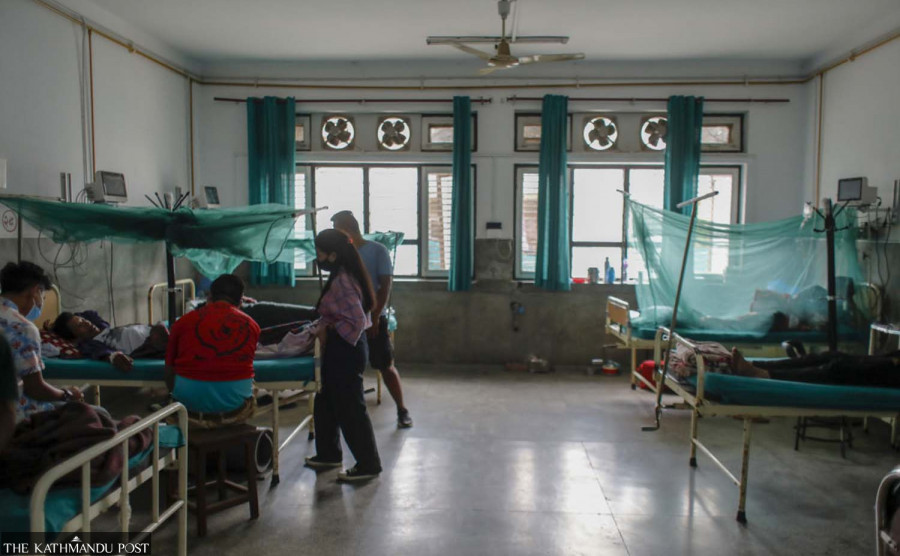Health
Dengue cases reported from 72 local units
The health ministry says 520 dengue cases have been reported since January this year.
Post Report
The Ministry of Health and Population said on Monday it had alerted all agencies concerned of a possible outbreak of dengue epidemic in the coming days. The ministry’s move comes amid reports of a dengue outbreak in several districts.
“We have alerted all agencies concerned, including local units throughout the country about a possible risk of dengue outbreak,” said Dr Gokarna Dahal, chief of the Vector Control Section at the Epidemiology and Disease Control Division. “We have requested them to carry out various activities, including an awareness drive.”
Dengue is a mosquito-borne disease transmitted by female Aedes aegypti and Aedes albopictus mosquitoes. The same vector also transmits chikungunya, yellow fever and Zika, according to the World Health Organisation.
Although the post-monsoon season is considered fertile for dengue transmission, Nepal has witnessed outbreaks of the deadly disease since the start of the year and in the pre-monsoon and monsoon seasons as well. Experts say the virus has become endemic, as cases of infection have been reported throughout the year.
According to data provided by the Vector Control Section under the division, dengue cases have been reported from 72 local units of 35 districts. So far, 520 cases of dengue infection have been reported since January this year.
“We have sent a separate letter to the respective local units, where dengue cases have been reported and asked them to take measures to prevent a massive outbreak of the deadly virus,” said Dahal. “We have also proposed allocating a budget to all 753 local levels to carry out preventive measures against the dengue virus.”
In 2022, dengue spread across all 77 districts of the country. At least 88 people died and more than 54,000 were infected by the virus.
Doctors say the number of deaths from dengue infection in Nepal is too high. In 2019, only six people died of dengue infection, which had spread to 68 districts of the country. Medical experts blamed negligence in the management of dengue cases, not taking preventive measures, lack of public awareness to the risks, and the delay in seeking healthcare services after the infection as possible reasons for the high death rate last year from the virus.
Experts say, the reported dengue cases could be just the tip of the iceberg, as around 90 percent of the infected people do not show any symptoms. Those closely tracking the cases suspect that many more people may have succumbed to the disease as not all deaths get reported, just like during the Covid pandemic.
The World Health Organisation says there is no specific treatment for severe dengue, but early detection and access to proper medical care can lower fatalities.
Dengue virus serotype 1 (DENV-1), 2 (DENV-2), and 3 (DENV-3) have been found to be responsible for the dengue epidemic in the country. Studies were carried out at the Tribhuvan University and the BP Koirala Institute of Health Sciences, according to the officials at the Health Ministry.
Entomologists warn that dengue cases could surge once again, as no serious initiatives have been taken to destroy the eggs of infected mosquitoes.
Mosquitoes that cause dengue breed in clean water and infect people during daytime. Uncovered water tanks and discarded plastic cups and bottles could also shelter dengue-carrying mosquitoes.
According to doctors, mild to high fever, severe muscle pain, rashes, severe headache, pain in the eyes, and vomiting are some of the symptoms of dengue.
Abdominal pain, vomiting, bleeding from the gums and nose, vomiting blood and blood in stool, tiredness, and restlessness are symptoms of severe dengue.
Severe dengue is a leading cause of serious illness and deaths, doctors say.
Disposing of solid waste properly, covering or emptying water storage containers, using personal household protection such as window screens, and wearing long-sleeved clothes are some of the measures to prevent infection from dengue.




 9.89°C Kathmandu
9.89°C Kathmandu














